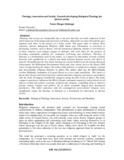Theology, innovation and Society: Towards developing Dialogical Theology for African society
Abstract
Theology and society are inseparable due to the fact that they are both composed of that
which makes for both human and universal well-being. Indeed the two have through the ages
inspired each other in the pursuit of a better world. This paper aims to explore three
religions; African Indigenous Religion (AIR) Islam and Christianity as practised in
developing countries such as Kenya, with the intention of deducing whether or not believers
of these religions (can engage) engage in dialogue with each other for the purpose of
providing sustainable solutions for community well-being and wholeness. Theology of
dialogue is a methodology used by the author, as a means for innovation; towards creating
harmony and equilibrium in a plural and multi-religious Kenyan society and Africa in
general. Of significance for this timely theological concept in Africa are the dreams that need
achievement; the Millennium Development Goals and state visions such as the Kenya 2030
vision. In approaching the subject, the author shall endeavor to outline pre-colonial, colonial
and post-colonial religious histories in Africa. The author shall use the Midzi-Chenda
(written Mijiknda) community of Coastal Kenya as a case study population. This choice is
due to their diverse and long-lived inter-cultural and inter-religious experiences, particularly
with the Arab, Portuguese and British conquests along the East Coast of Africa. The triple
conquest experiences influenced the Midzi-Chenda community negatively and positively in all
spheres of their life-system; economic, political and religious, compelling them to embrace
foreign culture, religion and politics, all of which gradually shaped their theological
parameters. This latter experience and the contemporary post-colonial religious wave
significantly situate the theology of dialogue as a benchmark for innovation in African
society.

